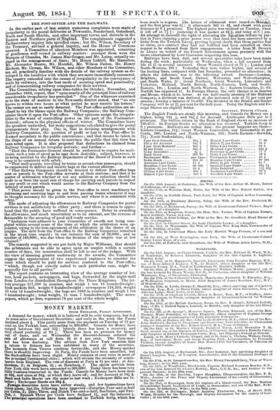Tag POST-OFFICE. AND TER RAILWAYS.
In the earlier part of last seed= numerous complaints were made of irregularity in the postal deliveriei at Newcastle, Sunderland, Gateshead?, North and South Shields, and other important towns and districts in the Eastern and Northern parts of E'nerind. The complainants suggested a Parliamentary inquiry into specified eases; but Mr. Wilson, Secretary ot the Treasury' advised a general inquiry, and the House of Commons assented. ACommittee of nineteen Members was appointed, consisting of gentlemen well versed in railway matters : amongst them were the Marquis of Chandos, M. James Mae Gregor, and Mr. Laing, actually en- gaged in the -management of lines; Mr. Henry Liddell, Mr. Hamilton, Mr. Alexander Hastie, Mr. Horsfall, Mr. Willson Patten Mr. Henry Herbert, Mr. Cowan Mr. Wilson, an.d other Members of the Committee, amen, practically Cowin, with the details of the railway system as de- veloped in the localities with which they are more immediately connected. The,inquiry extended into the mime of irregularity in the conveyance of mails by railways, into the best mode of securing speed and punctuality, and of remunerating railway companies for their services. The Committee, relying upon time-tables for October, November, and December 1853, report; that upon nearly all the principal lines of railway- considerable irregularity has prevailed." One of the witnesses examined as to the state of matters in the Newcastle district stated, that "no one knows to within two hours at what period he may receive his letters!' The causes are not so easily detected: The Post-office authorities are in- clined to lay the blame upon the Railway Companies ; the Railway Com- panies throw it upon the Post-office. Other opinions assign the irregula- rities to the want of controlling power on the part of the Postmaster- General ; others to the physical effects of winter. The Committee leave the question undecided, but make stispestions calculated to give the postal arrangements freer play. One is, that in devising arrangements with Railway Companies, the question of Rrofit or loss to the Post-office be deemsd secondary to the-public convenience; and that means be taken in the shape of an annual return to convince the public that this view has been acted upon. It is also- proposed that deductions be claimed from Railway Companies for irregular arrivals ; and further- "That the Postmaster-General should be authorized to require for mail- trains such a rate of speed as he may deemdesirable • subject, however, to its being certified by the Railway Department of the.hoard of Trade in such case,e to be consistent with safety.
"'That mail-guards, travelling by trains as second-class passengers, should be empowered to deliver and receive bags at the various stations. "That Railway Companies should be directed to deliver Post-office bags sent as parcels to the Post-office servants at their stations; and that it be matter of arbitration whether or not any addition or reduction should be made to or from the usual rate cf charge for carrying such parcels in respect to any profit or cost which would accrue to the Railway Company from the delivery of such parcels. "That power should be given to the Post-office to erect machinery for delivering and receiving bags to and from passing trains whenever it may be thought necessary for the public service, and where it is consistent with safety."
The mode of adjusting the allowances to Railway Companies for postal services is Rot satisfactory to either party ; and there is reason to appre- hend that the public have suffered in consequence. Delay in awarding the allowance, and much uncertainty as to its amount, are the reverse of favourable to the securing of good and ready service. "Instances were adduced to your Committee of awards not being com- pleted within several years of the time, at which the arbitrators were ap- pointed, owing to the pop-agreement of the arbitrators in the choice of an umpire. The debt from the Post-office to the Railway Companies remained in the mean time unpaid ; in one instance the sum of 28,0001., and in another of 140,0001., was due when the decision of the umpire was at last obtained."
The remedy suggested is one put forth by Major Williams, that should the arbitaators not be able to agree upon an umpire within a certain number of days, the nomination shall be left to one of the judges. With the-viow of insuring greater uniformity in the awards, the Committee suggest the appointment of two experienced engineers to Consider the rates which should be paid for services rendered to the Post-office, "which,, though not exactly suited to each particular case, might be generally fair to all parties." The report contains an interesting view of the average number of let- ters, book packets, newspapers, and bags, forwarded by the night-mail from London for distribulion'throughout the Three Kingdoms. The let.. ters average 217,500 in number, and weigh 1 ton 16 hundredweight; kook packets 865, weight 6 hundredweight; newspapers 124,333, weight 10 tons 19 hundredweight ; the bags are 1085 in number, and weigh 1 ton 6 hundredweight ; total weight, 14 tons 7 hundredweight. The news- papers, which go free, represent 76 per cent of the whole weight.


























 Previous page
Previous page